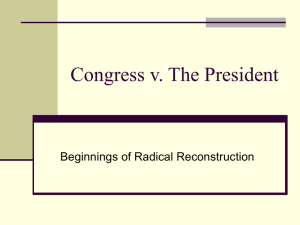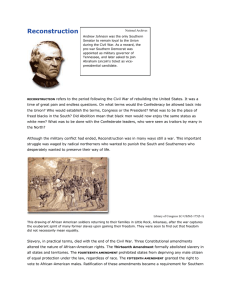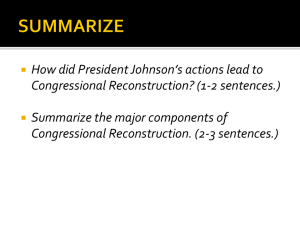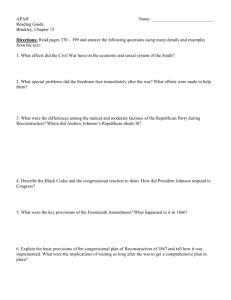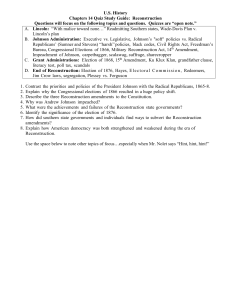Chapter 22
advertisement
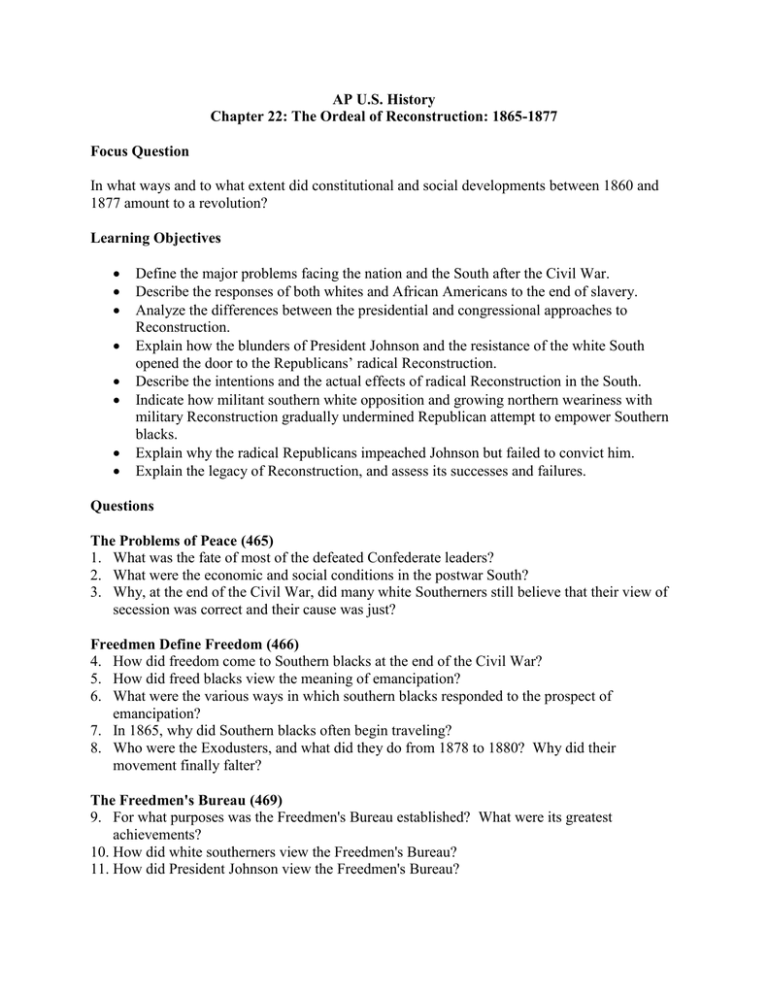
AP U.S. History Chapter 22: The Ordeal of Reconstruction: 1865-1877 Focus Question In what ways and to what extent did constitutional and social developments between 1860 and 1877 amount to a revolution? Learning Objectives Define the major problems facing the nation and the South after the Civil War. Describe the responses of both whites and African Americans to the end of slavery. Analyze the differences between the presidential and congressional approaches to Reconstruction. Explain how the blunders of President Johnson and the resistance of the white South opened the door to the Republicans’ radical Reconstruction. Describe the intentions and the actual effects of radical Reconstruction in the South. Indicate how militant southern white opposition and growing northern weariness with military Reconstruction gradually undermined Republican attempt to empower Southern blacks. Explain why the radical Republicans impeached Johnson but failed to convict him. Explain the legacy of Reconstruction, and assess its successes and failures. Questions The Problems of Peace (465) 1. What was the fate of most of the defeated Confederate leaders? 2. What were the economic and social conditions in the postwar South? 3. Why, at the end of the Civil War, did many white Southerners still believe that their view of secession was correct and their cause was just? Freedmen Define Freedom (466) 4. How did freedom come to Southern blacks at the end of the Civil War? 5. How did freed blacks view the meaning of emancipation? 6. What were the various ways in which southern blacks responded to the prospect of emancipation? 7. In 1865, why did Southern blacks often begin traveling? 8. Who were the Exodusters, and what did they do from 1878 to 1880? Why did their movement finally falter? The Freedmen's Bureau (469) 9. For what purposes was the Freedmen's Bureau established? What were its greatest achievements? 10. How did white southerners view the Freedmen's Bureau? 11. How did President Johnson view the Freedmen's Bureau? Johnson: The Tailor President (469) 12. Why had Andrew Johnson been put on Lincoln's ticket as vice president in his second term? 13. To which political group did Andrew Johnson most appeal? Presidential Reconstruction (470) 14. What were the provisions of Lincoln's 10 percent plan for Reconstruction? 15. How did the Wade-Davis bill and the controversy surrounding the readmission of the Confederate states to the Union demonstrate the deep differences between President Lincoln and Congress? 16. What was the goal of President Johnson's plan for Reconstruction? The Baleful Black Codes (471) 17. What was the main purpose of the Black Codes? What were their major provisions? 18. What did the enactment of Black Codes indicate to many Northerners? Congressional Reconstruction (472) 19. Why did congressional Republicans fear that the post-war South would be stronger than ever in national politics? Johnson Clashes With Congress (473) 20. What were the political results of Johnson's veto of the bill to extend the Freedmen's Bureau? 21. What was the Congressional response to Johnson's veto of the Civil Rights Bill of 1866? 22. What did the Fourteenth Amendment guarantee to freed slaves? What were its provisions regarding former Confederate leaders? 23. Why was Tennessee the first ex-Confederate state to be readmitted to the Union under congressional Reconstruction? Swinging 'Round the Circle with Johnson (474) 24. What was the root cause of the battle between Congress and President Andrew Johnson? 25. What were the issues and results of the 1866 congressional elections? How successful was President Johnson's "swing around the circle" campaign? Republican Principles and Programs (474) 26. On what fundamental principle about black voting rights did moderate and radical Republicans agree? Reconstruction by the Sword (475) 27. What was the last of the Reconstruction era amendments, when did it pass, and what were its provisions? 28. How did 1877 signal the end of Radical congressional Reconstruction of the South? No Women Voters (476) 29. How had women's rights activists campaigned for black emancipation during the Civil War? How did their goals change during the Reconstruction era? 30. Why were many feminist leaders deeply disappointed with the Fourteenth and Fifteenth Amendments? The Realities of Radical Reconstruction in the South (477) 31. What were the functions of the black Union League? 32. During Reconstruction, what new political roles did black women assume? 33. What were the positive accomplishments of Radical Reconstruction state governments in the South? 34. Why is it incorrect to blame political corruption in Reconstruction state governments on black voters and Republican rule? The Ku Klux Klan (479) 35. Which description best fits the Ku Klux Klan: an attempt to revive the Confederacy; the military arm of the southern Democratic party; a civic reform and service organization; or a secret terrorist organization? 36. What were the main motives for the formation of the Ku Klux Klan and what were its goals? 37. How was the Ku Klux Klan able largely to achieve its goals even though it was being suppressed by the Force Acts and the Union Army? 38. What description of the KKK did a group of Kentucky blacks provide in an 1871 letter to Congress? Johnson Walks the Impeachment Plank (480) 39. What was the official charge that the House of Representatives used to impeach President Johnson? A Not-Guilty Verdict for Johnson (481) 40. Why did the Senate narrowly acquit Johnson on the impeachment charges? The Purchase of Alaska (481) 41. What great success in foreign relations did Secretary of State Seward achieve in 1867? The Heritage of Reconstruction (482) 42. What might have been the result if Thaddeus Stevens' radical program of drastic economic reforms and stronger protection of political rights had been enacted?
